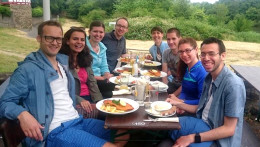January, 26th, 2021 by Dr. Christian Bode
E-Mail: bode.chr[at]web.de
What do we learn for the future from the current Corona Crisis And particularly so in respect of international exchange and cooperation?
I remember that in the seventies the famous Club of Rome, after having warned the world about the “Limits to Growth”, published a book with the title
“No limits to learning – in Germany titled as – “Die Zukunft des Lernens”.
One of the main messages was the requirement “to see the present age with the eyes of the future”. A good idea indeed.So, imagine for a moment you are thirty years ahead, 2050, talking with your kids: What will you be proud of having done in the twenties, what will you be ashamed or sad of having missed or ignored? The Club of Rome derived his demand for new forms of learning from the finding that
so far mankind has learned only from big catastrophes and that we cannot afford this costly method any longer.
Instead, we should learn to anticipate the future. But, did we adopt this advice? I’m afraid, we did not. But do we at least draw the right
conclusions from the catastrophes that we witness today? I have my doubts. There are several catastrophes under way, most of them produced by ourselves, with climate change at the top. Among these is Corona, by far not the only disease, not the first one and so far not even the most dangerous ever, but unique in the sense
that the new era of globalization has spread it all over the world almost simultaneously. And that is indeed a totally new challenge and experience.
Now, given the few minutes that I have, I will just express a few ideas of what we can learn, what we should learn from the current disaster – and you will see at the end that in spite of the actual misery the learning outcomes are mostly positive and optimistic:
1. We should learn to live with the virus: Instead of stumbling from one lockdown to the next and hoping for a kind of “Blitzkrieg-victory” we should adopt a long-term perspective assuming that the virus will keep on shaping our daily life at least for the next year- hopefully in a diminishing dimension depending on the vaccination
progress. That means that our concepts should no longer aim at surviving the next 4 weeks but at developing sustainable strategies including a regular review of our risk management. ( In this sense I have no understanding, for instance, that our libraries and museums are closed and that any individual sport is forbidden. There are better concepts in place. In the same sense I have no understanding that so many schools and university professors are still experimenting half-heartedly with digitalization instead of developing sound concepts of blended learning).
2. We should learn to be better prepared for the next pandemic which is already lurking in the background. I do hope that we will fight this next disease with a better, maybe even globally coordinated, strategy.
3. Global strategies are needed: We should learn that at the end of the day this global disaster will only be overcome by globally concerted action. As much as it is a result of globalization it must be dealt with on a global scale. There are already encouraging- but also irritating- experiences in the fight for vaccines. What we observe now is a global test on international cooperation and solidarity.
4. Science matters: You surely agree to this statement but still not everybody does. Vaccination may be the only solution as it was for other diseases. But virology, epidemiology and related medical expertise are not the only sciences which have a role to play. We also need economists, political scientists, lawyers, sociologists, psychologists, educational experts and more. We should learn to bring those related sciences together and, where appropriate, organize international formats.
5. Science Communication to be intensified: The increased appreciation of Science at large comes along with a growing responsibility for public explanation and communication. Again, we are witnessing new encouraging examples of best practice.
6. Challenge the human creativity: every challenge sets free new solutions, unconventional ideas, drives creativity in all fields from technology to cultural behavior. We should encourage this creativity, invest more venture capital and get rid of overwhelming bureaucratic restrictions which we have developed over the years.
7. Finally and most importantly in my view: If we understand Corona as a warning and an appeal, it might help us to readjust our attitude towards nature, to redefine the role of mankind as part of that nature, to replace our dominant arrogance by a sense of humility and responsibility and to strengthen our commitment for the
global community and international solidarity. If only part of that would materialize the corona pandemic, in a historical view, once might be seen as “a blessing in disguise”. Coming to an end, allow me still a couple of words concerning the future of international academic cooperation and exchange.
Firstly: Yes, I expect a boost in international connectivity and cooperation thanks to the landslide success of the digital formats which will partly replace physical mobility, but mostly add to it, prepare it and follow it up , in brief: Will improve international cooperation in quantitative and qualitative terms. This conference is just a small, but excellent example of the new possibilities which we will enjoy.
Secondly: No, I do not expect nor do I accept that international exchange and cooperation in terms of physical mobility should be reduced in the future, as some voices already demand. And by physical mobility I don’t mean the conference hopping from 2 days in Melbourne to 3 days in Toronto, my concern is more with the long-time exchange
and study abroad. Covid will be no argument in the long run. Instead, it is Climate change and Carbon footprint that matter of course.
But before drawing the wrong conclusions, let’s have a look into the relevant facts: there are currently some 6 million international students, which is not more than 3 % of the total student number world-wide. You may add some hundred thousand staff who are internationally mobile. Now compare this number with the 1.5 billion tourists every year out of whom 60 per cent use aircraft transportation. And add the exploding number of ugly cruises which poison the oceans and the atmosphere with their fat oil. Yes, I’m absolutely in favor of charging a carbon footprint compensation to each transport ticket, including even the DAAD-tickets. But no, I’m absolutely against any reductions in educational and scientific international mobility. On the contrary, we should increase the number of international students world-wide to at least 10 %.
For one thing is sure: in our times of ever growing globalization and interdependencies we need future leaders in politics, economy and society at large who have seen the world, who once in their life have left their comfort zone, have experienced to be a foreigner and have developed an understanding for different languages, cultures, ways of thinking and living. Because, as Alexander von Humboldt has said:
“Dangerous is the world-view of those who have never viewed the world”.
—————————–
Now, returning to the start of my talk, there is maybe one single advice which I might give concerning the uncertain future, drawing from the lessons of the past: The forthcoming decades will see as many changes and challenges as we saw in the past, many of them unforeseen, some of them inevitable, but most of them ambiguous and ambivalent with potential for the better or for the worse, the answer depending on you and your generation. So the only advice for the future I can give is: Prepare for change and be optimistic that the forthcoming challenges can be met.
Download: Bode_Statement_WelcomeReception_What do we learn from the pandemic? (pdf, 121.27 KB)
Additional information
Categories
- General (17)
- Germany Behind the Scenes (8)
- Reports (47)
Keywords
- Berlin (21)
- Bonn (7)
- Bonn Dr. Christian Bode (1)
- Braunschweig-Hannover (1)
- Cologne (1)
- Dresden (4)
- Düsseldorf (2)
- Freiburg (2)
- Hamburg (1)
- Heidelberg (1)
- Karlsruhe (1)
- Marburg (1)
- Munich (7)
- Rhine-Main (3)
- Rhine-Neckar (2)
- Saarland (1)
- Stuttgart (1)
- Trier (1)
- Tübingen (3)

